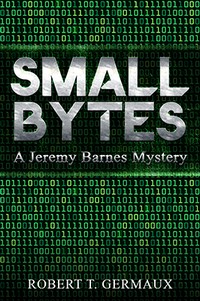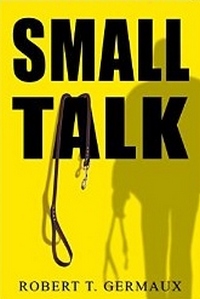When I ask for help with some project or another, one of the first and surest names I’m going to see is Robert Germaux. And this latest call for Guest Posts was no exception. Today’s Guest Post is from his collection, Grammar Sex 4 (Seriously?): Yet Another Book of Essays About Life and Stuff. I should stress I didn’t know he was going to talk about me when I picked this one from a list of titles, but it’s an added pick-me-up for me.

Books and More Books
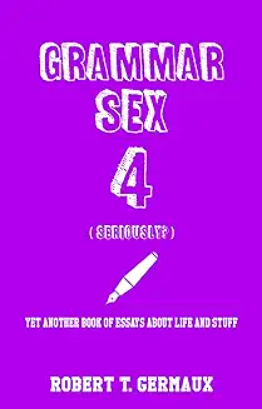
My wife and I have a lot of books. Well, actually, I should walk that statement back a bit and just say that Cynthia and I have been buying books for decades. Whether we have “a lot” depends, of course, on one’s perspective. Compared to some people we know, we do, indeed, have a lot of books, but compared to others, like H.C. Newton, book blogger extraordinaire out in the Boise area, we don’t have a lot of books at all. Perspective. Anyway, here’s a rough count of the number of books currently taking up space in casa Germaux. We have about one-hundred-ten hardbound books, down considerably from a good many years ago when we donated several boxes of books to a nearby library. We also have sixty or so paperbacks. And, of course, we have around seventy-five eBooks (a number that fluctuates almost weekly) stored on our various devices. However, as you’ll soon see, those electronic literary efforts don’t factor into this essay.
For some time now, we’ve been thinking about downsizing. We love our four-bedroom, two-and-a-half-bathrooms home, but we’re ready to stop having to deal with the routine maintenance issues that go with home ownership, let alone the not-so-routine issues (frozen pipes a few Februarys ago, a big maple tree that had to be removed from our front yard this summer, etc.). So we’re looking at a move back to apartment life, where someone else can deal with those burst pipes in the middle of a Pennsylvania winter while the Germauxs are soaking up the sun on some tropical island.
Back to the books. When we finally make that move to an apartment or townhome, we know a lot of the “stuff” we’ve accumulated over the past three decades won’t be making that journey with us. Some of the decisions about what things will make the cut and what things won’t will be easy. Certainly, we won’t be taking all four of our flat-screen TVs. Yeah, we have four flat-screens. (See “What Would Henry David Think?” in More Grammar Sex.) And wherever we end up, I’m sure we won’t need all the furniture we currently have, or all the lamps, not to mention some of the souvenir mugs we’ve purchased over the years on vacation trips, plus a whole lot of other stuff that I can’t think of at the moment. Some of that stuff we’ll probably put in one of those storage units you can rent, but a lot of it we’ll end up giving away to local charities. The books, though, will require a little more thought.
About forty of those hundred or so hardbound books we own are Spenser novels by Robert B. Parker. I discovered Parker back in the mid-seventies when I happened upon The Godwulf Manuscript (the first Spenser mystery) while wandering the stacks in our local library. I was immediately hooked, as was my wife when she read the book, and over the years, we’ve purchased every new Spenser as soon as it was released. We also have most of those books in paperback (because they were much easier to take with us on vacations). And with the advent of eBooks, we also have most of the Spensers in that format. Thus, I’m sure we’ll eventually be donating our hardbound Spensers, and probably the paperbacks as well, to any library that wants them. Although there’s one hardbound Spenser that’s definitely going with us when we move: Hush Money, which Parker signed for Cynthia and me when we heard him speak at the Mystery Lovers Bookshop in Oakmont, PA, in the spring of 1999. And if you’ll forgive a purely personal side note, the aforementioned H.C. Newton has on a couple of occasions said my Jeremy Barnes character has a “Spenser-like vibe,” probably the greatest compliment anyone has ever paid this boy’s writing.
In addition to that autographed Spenser novel, there are other hardbounds we’ll be keeping, mainly gifts Cynthia and I have exchanged over the years, books with sentimental value because of the notes we’ve written in them. I’d like to share just two examples of those notes here.
On my 61st birthday, the love of my life gave me a copy of About Alice by the award-winning humorist Calvin Trillin. The book, written in 2006, consists of a series of essays in which Trillin writes lovingly about the love of his life, Alice, an author and educator who died five years earlier. Inside the front flap of that book, my wife (an educator herself) wrote the following:
She’s a teacher. He’s a writer.
It’s a love story. I hope you like it.
Love,
Cindy
Yeah, I’m not the only one in the family with some writing chops.
A couple of years later, Cynthia and I celebrated our 40th wedding anniversary with a week in Paris. My wife, a total foodie whose culinary skills I’ve mentioned in previous essays, was in her element on that trip. I’m not going to say that we dined at every sidewalk café and Michelin-starred restaurant while we were there, but we did try to sample as many of that city’s gastronomic offerings as could be squeezed into a seven-day stay. And just a few years later, for her birthday, I gave Cynthia a copy of Paris, My Sweet by Amy Thomas. Here’s the note I wrote to my wife:
I mean, c’mon, 263 pages crammed with delightful descriptions
of both the City of Light and mouth-watering delicacies-
Amy Thomas might as well have just gone
ahead and dedicated the thing to you.
Love,
Bob
So we’ll be keeping that book, too.
One more, okay? This one’s very special to my wife. My book Love Stories is a semi-biographical novel based on the six weeks Cynthia spent in Europe the summer before her senior year in high school, a time when, unbeknownst to her, one of the boys in her tour group fell deeply in love with her. (We later learned that Dean was actually on his way to see Cynthia four days before our wedding. If you wanna know more about that, and the fictional narrative I created about Cynthia and Dean reconnecting twenty years later, you’re going to have to spring for the $2.99 to buy the book. Or just email me and maybe I’ll send you a free copy.) At the end of Love Stories, I tell my readers that the book wouldn’t have been possible without the journal my wife kept every day during those six weeks in Europe. And she had that journal because her father gave it to her shortly before she departed on that journey, urging her to keep a daily diary during her travels. At least half of what I wrote in Love Stories came directly from that journal. Cynthia’s father was an educator, but he was also quite a writer himself. Between 1942 and 1976, he wrote what he described as a number of “random thoughts and observations” on whatever topic caught his attention. Shortly before his death in 1976, Dad wrote the last entry in Meanderings and Mementos, a collection of those random thoughts of his, most in one poetic form or another. The family had Meanderings and Mementos published as a tribute to Dad’s life. In the beginning of the book, he said he was dedicating it to his children (Kathleen, Maureen, Cindy and Mike). Then he added this:
Personal Thanks To-
My daughter, Cynthia Ann, who frequently
urged her father to assemble a collection
of his own brainchildren.
I still love holding an actual book in my hands, flipping through the pages, going back to a previous chapter with a flick of my wrist, but as Bob Dylan said, the times, they are a-changin’, and the days of Cynthia and me lugging a stack of books through an airport on a vacation to some far-off land are over. Sometimes, boys and girls, you gotta go with the flow.
What about you? How many books are in your library? Which ones can’t you bear to part with, for whatever reason? Even if, like Cynthia and me, you’ve been making the move to eBooks, it wouldn’t hurt to keep a few of those old hardbounds around, sort of a nod to the past, to a time when getting a book meant going to a bookstore, or maybe a library, where you could wander the stacks just to see what was there. If you’ve ever done that, maybe you were lucky enough to spot a book that caught your eye, a book by an author who went on to write a few dozen more books you couldn’t wait to read. If you’re planning to downsize anytime soon, I’ll understand if you decide to hang on to one or two of those books, just to remember the first time you leafed through those pages and fell in literary love with a character or a setting or a plotline. Believe me, I’ll understand.
You can find more information about Bob and his books at his Amazon Author Page.

 Grammar Sex and Other Stuff:
Grammar Sex and Other Stuff:

![]()


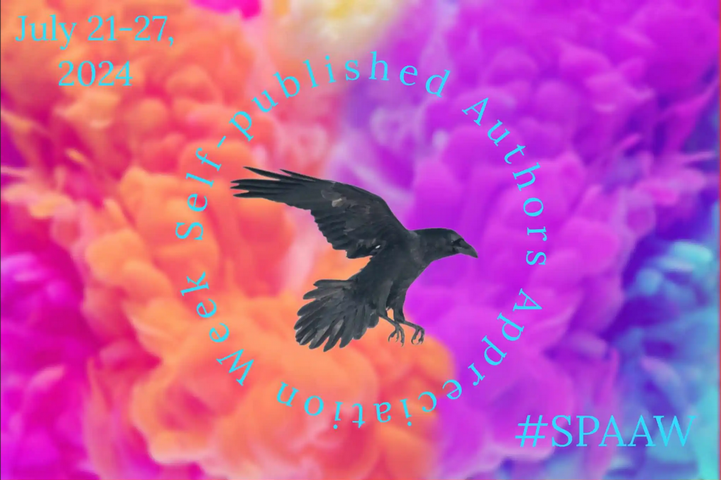

 Also, as a Jeremy Barnes reader, I want to try to gin up some interest in this.
Also, as a Jeremy Barnes reader, I want to try to gin up some interest in this.



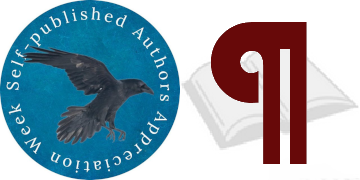
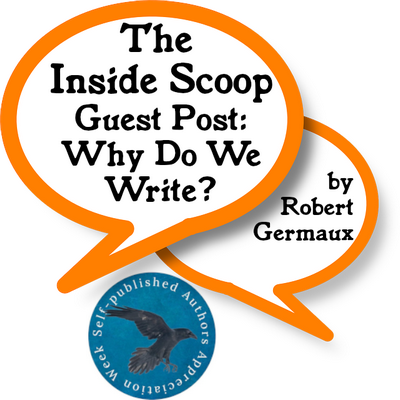 Robert Germaux has always been game for anything I’ve asked him if he wanted to do–which is great, because I’ve always appreciated whatever he produces. Better than the things he’s done with me are the books that he’s provided for me and/or I’ve purchased. Like this post, for example, which is a revised version of something that appeared in one of his books and on this site a few years ago. He’ll be back for the Self-Publishing Q&A here in a few.
Robert Germaux has always been game for anything I’ve asked him if he wanted to do–which is great, because I’ve always appreciated whatever he produces. Better than the things he’s done with me are the books that he’s provided for me and/or I’ve purchased. Like this post, for example, which is a revised version of something that appeared in one of his books and on this site a few years ago. He’ll be back for the Self-Publishing Q&A here in a few.



